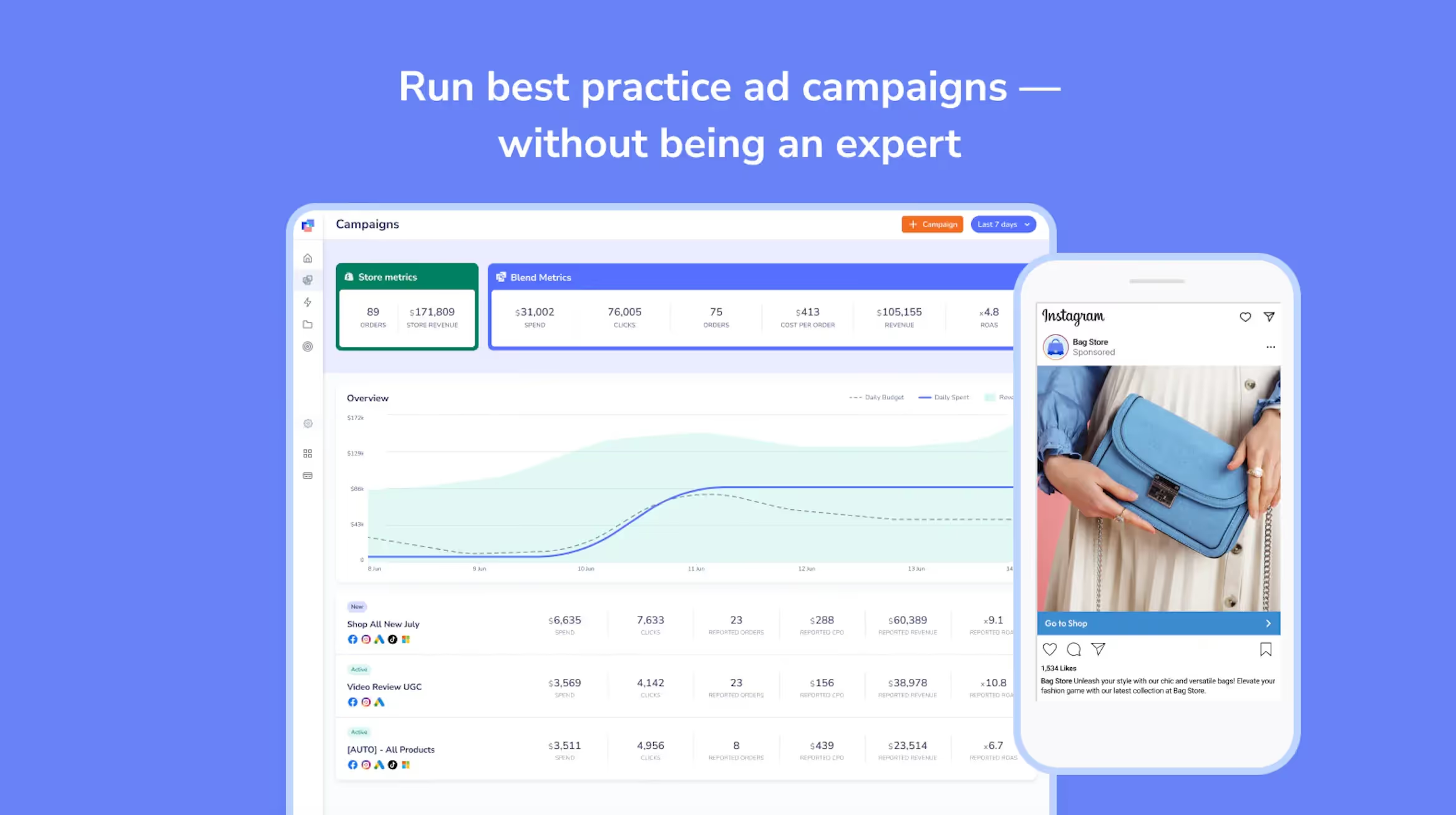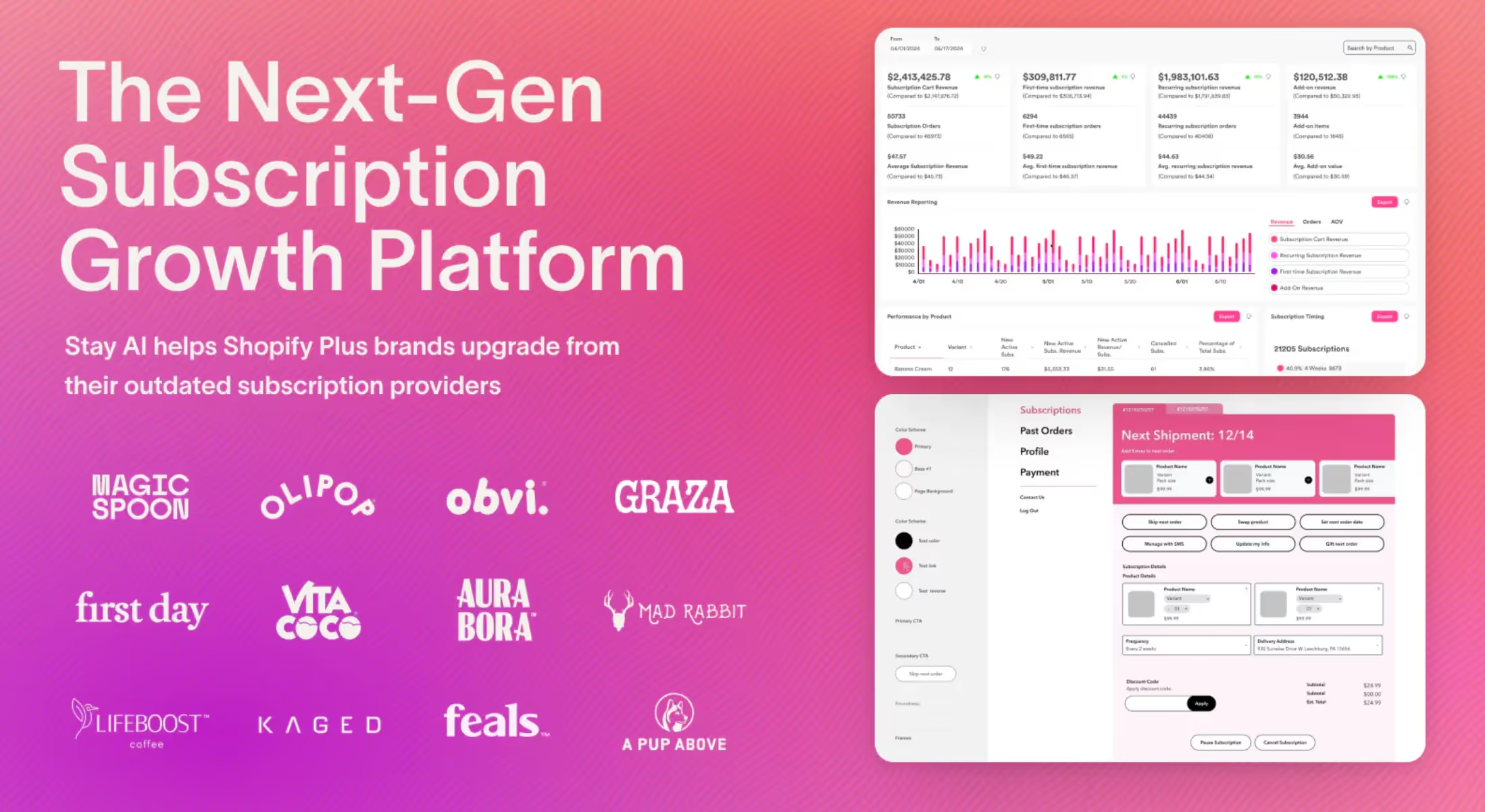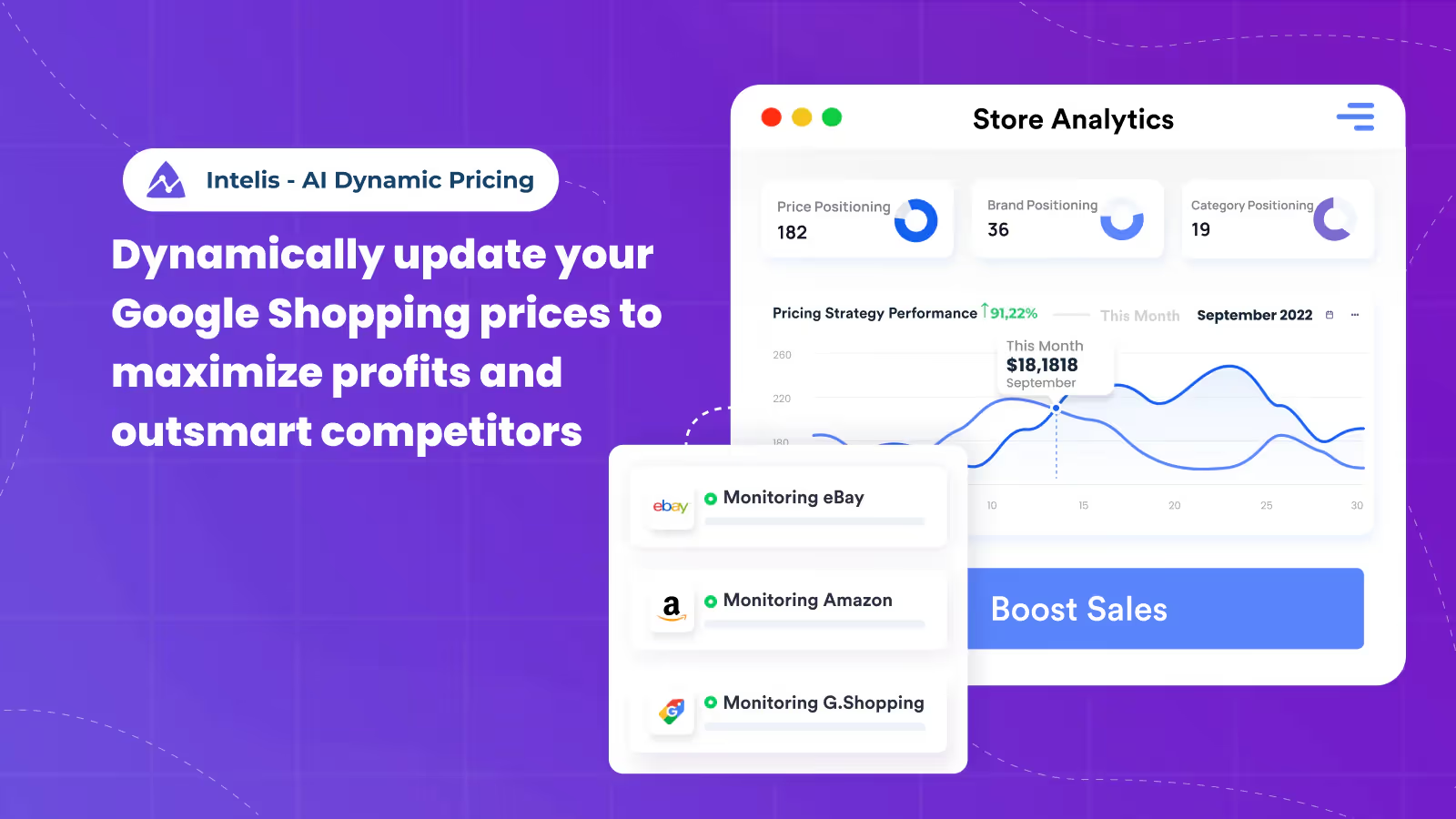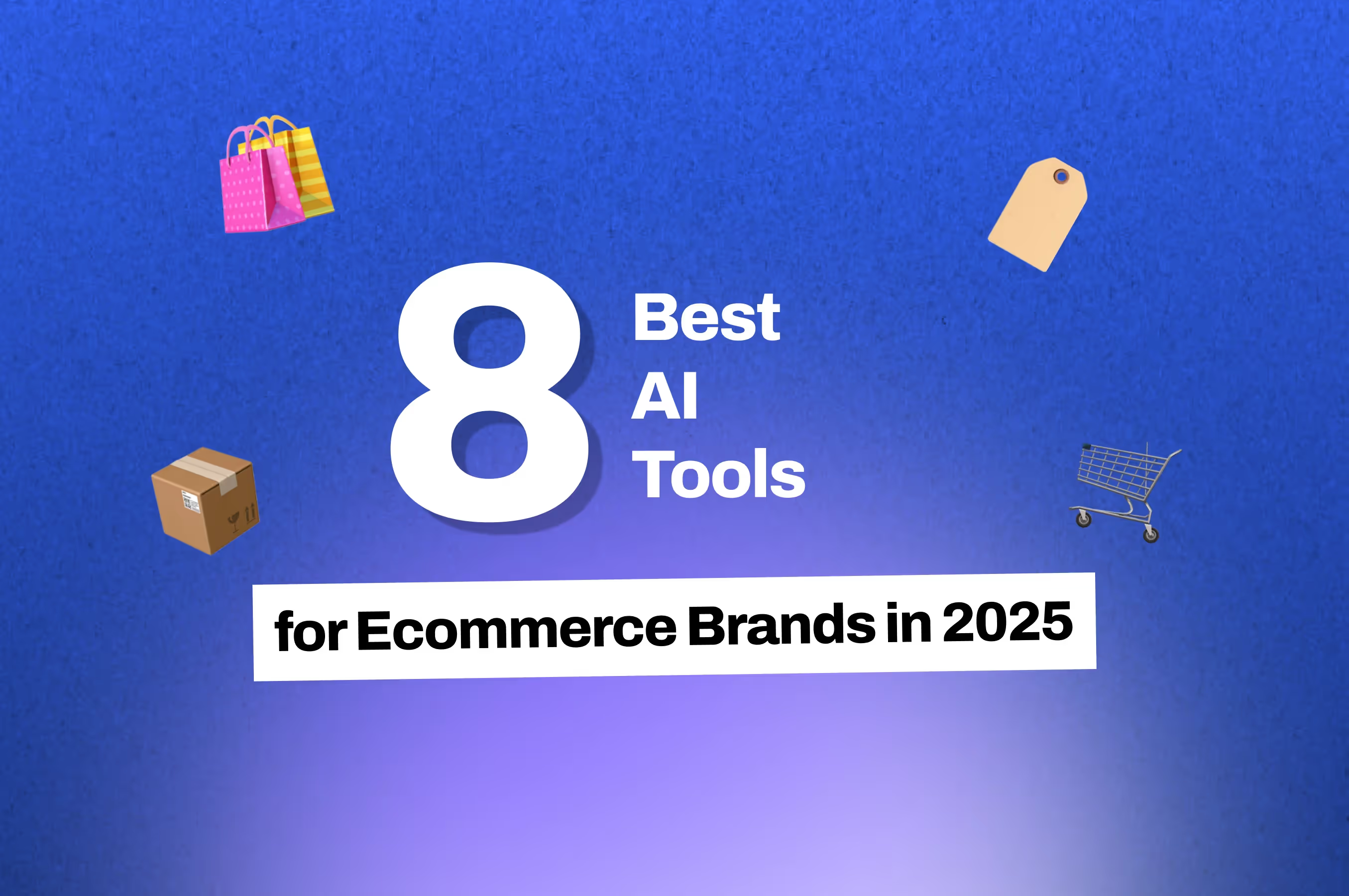After testing 100s of Ecommerce AI tools and solutions, I've identified the 8 best AI tools for Ecommerce brands that are changing how brands engage with customers, deepen relationships, optimize operations, and drive sales in 2025.
What is AI in Ecommerce?
AI in Ecommerce represents the strategic use of artificial intelligence to create smarter, more intuitive shopping experiences.
Whether it's an AI concierge helping customers find the perfect product or machine learning algorithms optimizing ad spend, these 8 Ecommerce AI tools are reshaping how DTC brands connect with their customers.
Why are Ecommerce AI tools and solutions important?
The competitive landscape of ecommerce has fundamentally shifted from what it was a few years back. Customers now expect more personalized experiences, instant responses, and seamless interactions across every touchpoint.
Ecommerce AI tools enable brands to meet these expectations while scaling operations efficiently. While many DTC brands focus on optimizing their websites, the most successful DTC brands are going beyond the web by launching dedicated mobile apps.
DTC brands with mobile apps see up to 3X higher conversions and 20% higher average order values, and 5X increase in LTV vs mobile web.
This explains why an increasing number of high-growth DTC brands are investing in AI-powered mobile app builders like Appbrew and ecommerce tools to create deeper, more intimate customer relationships with their customers.
What are the Best AI Tools for Ecommerce brands?
1. AI Concierge by Appbrew
Overview:
Appbrew's AI Concierge stands out as the most sophisticated customer assistance tool for mobile commerce. Unlike traditional chatbots that simply answer questions, this AI creates a shopping experience that mirrors having a personal expert sales associate, available 24/7.
It transforms your mobile app into an intelligent shopping assistant that understands customer intent, recommends products with purpose, and guides users through personalized shopping journeys optimized for conversions.
Features:
- Hyper-personal product discovery that reduces browsing friction and improves AOV with relevant suggestions
- Intent-based navigation where shoppers ask and Concierge answers instantly within the mobile app
- Hyper-personalized recommendations based on customer preferences and purchase history
- 24/7 AI assistance that works like your best in-store sales associate
Pros:
- Significantly reduces return rates by helping customers find products that truly suit their needs
- Increases average order value through intelligent cross-selling and upselling
- Provides offline empathy delivered online through personalized interactions
- Leverages mobile app's native capabilities for highly personalized user experience
Cons:
- Premium solution that requires mobile app
Pricing:
Custom pricing based on brand requirements and app complexity.
Shopify Rating: 5 out of 5 (42 Customers).
Best for: Brands with mobile apps seeking to create premium, personalized shopping experiences that drive 3X higher conversions, 20% higher AOV and 5X higher LTV.
2. Nosto AI
Overview:
Nosto AI emerges as a comprehensive commerce experience platform that transforms how brands deliver personalized experiences at scale. It enriches and connects customer, product, and content data to create authentic, relevant shopping experiences across all touchpoints.
Features:
- AI-powered site search with personalized product discovery capabilities
- End-to-end personalization that makes every shopping experience unique
- Advanced merchandising tools for total control over product rankings
- Personalized content and user-generated content integration
- Business intelligence dashboard with deep shopper insights
Pros:
- Comprehensive platform covering multiple aspects of ecommerce personalization
- Proven track record with strong customer reviews and ratings
- Seamless integration with existing ecommerce infrastructure
- Scales effectively for brands of all sizes
Cons:
- Custom pricing may be cost-prohibitive for smaller brands
- Complexity of features may require dedicated team management
Pricing: Custom pricing based on brand requirements and usage.
Shopify Rating: 4.7 out of 5 (62 reviews)
Best for: Established brands looking for comprehensive AI-powered personalization across their entire ecommerce ecosystem.
3. Searchanise AI
Overview:
Searchanise AI revolutionizes product discovery with its intelligent search capabilities and advanced filtering system. It helps customers find products in seconds while providing brands with powerful merchandising tools to boost sales and improve user experience.
Features:
- Smart instant search bar with matches across all store pages
- Voice search and personalized AI search capabilities
- Unlimited customizable filters including tags, prefixes, and default options
- Configurable live search results and product card content
- Merchandising tools with custom labels, sorting, and autocomplete rules
Pros:
- Affordable pricing makes it accessible for brands of all sizes
- Works out of the box with minimal setup required
- Highly customizable design and functionality
- Responsive support team and strong customer satisfaction
Cons:
- May lack some advanced features found in premium solutions
- Limited to search and discovery functionality
Pricing: From $19/month
Shopify Rating: 4.7 out of 5 (190 reviews)
Best for: Brands seeking to improve product discovery and search functionality without significant investment.
4. Blend AI

Overview:
Blend AI simplifies cross-channel advertising by leveraging machine learning algorithms to optimize ad performance across Google, Facebook, Instagram, Microsoft, and TikTok. It maximizes conversions while utilizing first-party data for improved targeting in a post-cookie world.
Features:
- Multi-channel campaign deployment in seconds
- Automated audience creation and funnel management
- AI-powered performance monitoring with automatic ROAS optimization
- First-party customer data integration for enhanced retargeting
- Seamless integration with Klaviyo for improved customer engagement
Pros:
- Streamlines complex multi-channel advertising management
- Automated optimization reduces manual campaign management time
- Leverages first-party data for better targeting accuracy
- Integrates well with existing marketing technology stack
Cons:
- Custom pricing may not be transparent for budget planning
- Requires existing advertising budget to maximize effectiveness
Pricing: Custom pricing based on advertising spend and requirements.
Shopify Rating: 4.4 out of 5 (62 reviews)
Best for: Brands running multi-channel advertising campaigns seeking automated optimization and improved ROAS.
5. Stay AI

Overview:
Stay AI distinguishes itself as the only AI-optimized subscription platform designed specifically to drive recurring revenue growth. It helps brands decrease subscriber churn, increase lifetime value, and optimize average order value through intelligent insights and personalized experiences.
Features:
- No-code customer portal with complete design and copy customization
- ExperienceEngine for creating unique promotions across subscriber journeys
- RetentionEngine with subscription revenue forecasting and churn prevention
- Advanced analytics with proprietary AI for data-driven decision making
- High-touch customer success team with easy migration support
Pros:
- Specifically designed for subscription commerce optimization
- Excellent customer reviews and ratings indicate strong satisfaction
- Comprehensive analytics and forecasting capabilities
- Dedicated customer success support for implementation
Cons:
- Higher pricing point may be challenging for smaller subscription brands
- Limited to subscription-based business models
Pricing: From $499/month
Shopify Rating: 5.0 out of 5 (114 reviews)
Best for: Subscription-based ecommerce brands looking to optimize customer retention and maximize recurring revenue.
6. LiSA AI
Overview:
LiSA AI transforms the online shopping experience through virtual try-on technology that lets customers see how clothes look on them before purchase. It addresses one of ecommerce's biggest challenges by reducing uncertainty and returns in fashion segment.
Features:
- AI virtual try-on with realistic visual representation
- Seamless Shopify integration without technical setup requirements
- Social sharing capabilities for virtual outfit combinations
- Outfit exploration tools that inspire larger orders
- Checkout integration to enhance the shopping experience
Pros:
- Directly addresses return rate issues in fashion ecommerce
- Easy integration with existing Shopify stores
- Encourages social sharing and word-of-mouth marketing
- Proven to increase conversion rates when customers can visualize products
Cons:
- Limited to fashion and clothing categories
- Newer solution with limited customer feedback available
Pricing: From $24.99/month
Shopify Rating: 5.0 out of 5 (1 review)
Best for: Fashion and clothing brands seeking to reduce returns and increase conversion rates through virtual try-on experiences.
7. Intelis AI

Overview:
Intelis AI provides powerful pricing intelligence that helps brands optimize pricing strategies and outperform competitors. With advanced matching AI and price tracking algorithms, it automatically monitors competitor prices on Google Shopping while providing actionable insights for dynamic pricing.
Features:
- Automatic competitor price matching and tracking
- Google Shopping insights for visibility and ad performance optimization
- AI-powered dynamic pricing strategies
- Simplified interface for clear, effective pricing decisions
- Detailed analytics and reporting for sales and profit margin optimization
Pros:
- Perfect rating indicates strong customer satisfaction
- Automated competitor monitoring saves significant time
- Clear ROI through optimized pricing strategies
- Ideal for high-SKU retailers and scaling brands
Cons:
- Limited to pricing optimization functionality
- May require significant product catalog for maximum effectiveness
Pricing: From $79/month
Shopify Rating: 5.0 out of 5 (31 reviews)
Best for: High-SKU retailers and scaling brands seeking automated competitor price monitoring and dynamic pricing optimization.
8. Prediko AI
Overview:
Prediko AI revolutionizes inventory management through AI-powered forecasting, planning, and purchase order management. It replaces spreadsheets with an advanced system that syncs with Shopify in real-time, helping brands avoid stockouts and overstock situations.
Features:
- AI sales forecasting for demand planning by SKU and product
- Inventory planning with out-of-stock alerts and buying recommendations
- Purchase order management system with tracking and bulk editing
- Detailed inventory reports with 100+ customization filters
- Bill of materials creation for finished goods component ordering
Pros:
- Excellent customer rating indicates high satisfaction
- Affordable pricing for comprehensive inventory management
- Real-time Shopify synchronization
- Eliminates manual spreadsheet management
Cons:
- May be overwhelming for brands with simple inventory needs
- Requires accurate historical data for optimal AI forecasting
Pricing: From $49/month
Shopify Rating: 4.9 out of 5 (112 reviews)
Best for: Growing ecommerce brands struggling with inventory management and seeking AI-powered demand forecasting.
How to Choose the Right AI Tools for Your Ecommerce Brand?
Selecting the right AI tools depends on your brand's specific challenges, budget, and growth objectives. Start by identifying your biggest pain points:
Are customers struggling to find products? Are you losing money on inefficient ad spend? Do you need better inventory forecasting?
Consider your technical capabilities and team resources. Some AI tools require minimal setup and work out of the box, while others need dedicated management and integration support.
Evaluate whether you need specialized solutions for specific functions or comprehensive platforms that address multiple challenges.
Look for solutions that integrate well with your existing technology stack. The best AI tools enhance your current systems rather than requiring complete overhauls.
Frequently Asked Questions
1. What's the difference between AI and automation in ecommerce?
AI learns and adapts from data to make intelligent decisions, while automation simply executes predefined rules. AI can understand customer behavior and make personalized recommendations, whereas automation follows fixed processes without learning or adapting.
2. How quickly can I expect to see results from AI ecommerce tools?
Most AI tools show initial improvements within 30 days, with significant results typically visible within 2-3 months.
3. Do I need technical expertise to implement Ecommerce AI tools?
Many modern AI tools are designed for non-technical users with drag-and-drop interfaces and automated setup processes.
4. Can small ecommerce brands afford AI tools?
Yes, AI tools are available at various price points, from $19/month for basic search functionality to enterprise solutions. Many tools offer scalable pricing based on usage, making them accessible for brands of all sizes.
5. Will AI tools replace human customer service?
AI tools complement rather than replace human customer service. They handle routine queries and provide 24/7 support, allowing human agents to focus on complex issues that require empathy and creative problem-solving.











